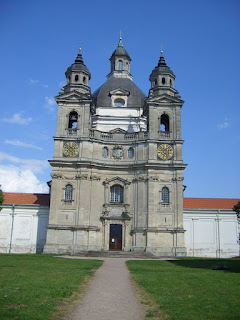
It has been a year or so after the trip to the Baltic, and actually it took me a while to finish up this blog. Indeed I had thought of giving it up due to laziness, but after half a year allowing the blog to stand idle, it suddenly aroused my motivation to continue with the blog and to make it complete. Nevertheless, it really reminded me back to my days that I spent in the Baltic, the incredibly long sunshine and the tremendously friendly people I have met along the way.
As my flight landed at Gatwick airport in London, I went busily across southern England to visit friends, and everywhere I go, people asked me about my trip. It was really great just to share the many moments of the time with them. I truly believe how travellers can make a difference to the world, be it a contribution to more peace and understanding or simply to contribute economically to the countries by spending our hard-earn dollars onto their economy.
What I really enjoy the most in the Baltic is its pristine nature and countryside, which is becoming more in scarcity due to continuing globalisation and industrialisation of the world, which only creates more pollution and destruction to the nature. A bicycle ride through Aukstaitijos National Park in Lithuania, or simply a hike across the Gauja National Park in Latvia reminds me how the world was suppose to be before us, human being comes. Indeed, that is how tourism board in all the three Baltic States promote themselves: nature, transquilty, country side tours, and the like. However, does nature exist only for the tourist's pleasure?
Well, partly true, I believe. But more importantly, it is also for educational purpose. Eco-tourists like us, when travelling to any natural places, always commit to an objectives of minimal destruction to the natural environment: do not leave anything behind but footprints, for example. Ecotourists, after visited a place, go home and talk to folks in our home not just about how beautiful the place is, but more about how we can contribute a part in preserving our world. This serves the educational purpose, I believe. Ecotourists, besides visiting nature, also serves to bridging cultural gaps. When we go into other places, we try to merge ourselves into their culture as much as possible, encouraging maximum interaction, both in ter ms of human conversation as well as participating in their lives, eating the local food, taking the local transportations, or if possible, learning their languages. This "culturally ecofriendly" way of travelling, I believe, also contribute positively to our world.
ms of human conversation as well as participating in their lives, eating the local food, taking the local transportations, or if possible, learning their languages. This "culturally ecofriendly" way of travelling, I believe, also contribute positively to our world.
Nevertheless, after the two days visiting the UK and on my way back to Hong Kong, I once again had the chance to pass over Helsinki airport. As I was sitting down in a small cafe eating the delicious smoke-salmon salad, it recalled my memories of the trip and the many moments I had spent in their country. While glaring in awe at the environmentally friendly way of how the airport was built, I murmured to myself, "That is how the world should suppose to be..."
And indeed, that is perfectly true.
As my flight landed at Gatwick airport in London, I went busily across southern England to visit friends, and everywhere I go, people asked me about my trip. It was really great just to share the many moments of the time with them. I truly believe how travellers can make a difference to the world, be it a contribution to more peace and understanding or simply to contribute economically to the countries by spending our hard-earn dollars onto their economy.
What I really enjoy the most in the Baltic is its pristine nature and countryside, which is becoming more in scarcity due to continuing globalisation and industrialisation of the world, which only creates more pollution and destruction to the nature. A bicycle ride through Aukstaitijos National Park in Lithuania, or simply a hike across the Gauja National Park in Latvia reminds me how the world was suppose to be before us, human being comes. Indeed, that is how tourism board in all the three Baltic States promote themselves: nature, transquilty, country side tours, and the like. However, does nature exist only for the tourist's pleasure?
Well, partly true, I believe. But more importantly, it is also for educational purpose. Eco-tourists like us, when travelling to any natural places, always commit to an objectives of minimal destruction to the natural environment: do not leave anything behind but footprints, for example. Ecotourists, after visited a place, go home and talk to folks in our home not just about how beautiful the place is, but more about how we can contribute a part in preserving our world. This serves the educational purpose, I believe. Ecotourists, besides visiting nature, also serves to bridging cultural gaps. When we go into other places, we try to merge ourselves into their culture as much as possible, encouraging maximum interaction, both in ter
 ms of human conversation as well as participating in their lives, eating the local food, taking the local transportations, or if possible, learning their languages. This "culturally ecofriendly" way of travelling, I believe, also contribute positively to our world.
ms of human conversation as well as participating in their lives, eating the local food, taking the local transportations, or if possible, learning their languages. This "culturally ecofriendly" way of travelling, I believe, also contribute positively to our world.Nevertheless, after the two days visiting the UK and on my way back to Hong Kong, I once again had the chance to pass over Helsinki airport. As I was sitting down in a small cafe eating the delicious smoke-salmon salad, it recalled my memories of the trip and the many moments I had spent in their country. While glaring in awe at the environmentally friendly way of how the airport was built, I murmured to myself, "That is how the world should suppose to be..."
And indeed, that is perfectly true.
More photos of London and Oxford:
More photos of Helsinki Vantaa Airport:
(Picture caption: 1. Me taking a picture of London skyline around the Thames river area. 2. A view of Helsinki Vantaa Airport, bright and sunny... resembles how the world should suppose to be.)

















